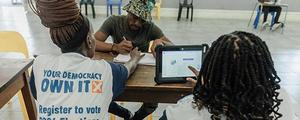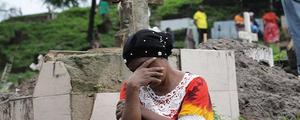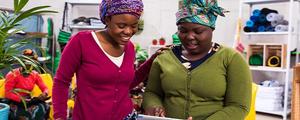WASHINGTON, D.C. -- Most African countries have publicly committed to empowering women and reducing gender disparities, but the newly released Gender Power in Africa report highlights how women in sub-Saharan Africa continue to face discrimination and reinforces the need for more data to study the problem.
The new report from Gallup and philanthropic organization Porticus analyzes how gender power imbalances shape women’s lives in five African countries and act as barriers to broader social and economic development.
The analysis examines gender equality in Kenya, South Africa, Tanzania, Uganda and Zimbabwe, incorporating quantitative data trends from the Gallup World Poll and international agencies like the United Nations and World Bank, as well as qualitative in-depth interviews with residents in each of the five countries.
Key Findings
In four of the five countries, fewer women -- and men -- said women in their country are treated with respect and dignity.
In Kenya, South Africa, Uganda and Zimbabwe, perceptions that women are treated with respect and dignity have fallen substantially in recent years. In 2021, just over a quarter of both men and women in South Africa felt this way, and about half of women in Kenya (50%) and Uganda (52%) said the same. In Zimbabwe, 60% of women responded this way, down from 71% in 2013.
Tanzania was the only country studied where the perception that women are treated with respect and dignity trended upward; 74% of women in Tanzania felt this way in 2021.

Line graphs. Percentages of adults in five African countries who say women in their country are treated with respect and dignity. Over the past decade, this figure has fallen in four out of the five countries surveyed.
The sharp decline in South Africans’ views that women are treated with respect and dignity is notable. Though it is one of the most economically developed countries in sub-Saharan Africa, South Africa has one of the highest rates of rape and femicide in the world.
In-depth interviews with men and women in these countries in 2022 shed additional light on the gender dynamics at play. Women were generally seen to be given fewer educational and employment opportunities than men and to have less freedom in their ability to make decisions about their lives:
“Well, I still feel sad about how women are generally treated in society and in family units, especially after achieving democracy in the country. I feel like, still to this day, women have to fight for their worth, not only in the society, not only in the workplace, but also in the family. We still find women being treated as assets, as things that can be discarded of, as things to be owned, not as human beings with a mind, with intelligence, with emotions, and yeah, that’s very sad. … I always to this day find myself having to fight, especially in the industry that I’m in, the arts, where the industry is male dominant, especially in offices where change can be effected.” (45-year-old woman, urban South Africa)
Relatively few women in any of these countries felt safe walking alone at night where they live.
Just 27% of women in South Africa said they felt safe walking alone at night in the city or area where they live, and less than half reported feeling safe alone at night in Zimbabwe (35%), Kenya (40%) and Uganda (45%). Only in Tanzania (61%) did the figure come close to the global average for women of 64%.
Notably, in the two countries where women were least likely to feel safe walking alone -- Zimbabwe and South Africa -- those living in urban areas were much less likely than those in rural areas to feel safe.
Though the subject is extremely sensitive, several female in-depth interview participants discussed experiences with domestic violence. Some had experienced gender-based violence directly from their husband or father, while others reported seeing their father beat or abuse their mother.
“[My father beating my mother] happened many times because my father was a drunkard. … It was war when he was drunk. Even we children, he would beat us. … It happened to me when I was married. I used to be beaten, and that’s why I left my marriage.” (58-year-old woman, rural Kenya)
Some in-depth interview participants -- particularly women -- also expressed concern about potential violence outside the home. Many viewed walking at night as something to be avoided unless they had a specific reason to be out. South African participants, in particular, voiced such concerns.
“[Walking at night is] not safe at all. I don’t feel safe as a woman. I make sure I am nowhere near outside by nighttime.” (30-year-old woman, rural South Africa)
Low civic engagement may limit women’s opportunities to learn about their rights.
Gallup data show that women are less likely than men to voice their opinions to officials. Results from the 2021 World Poll reveal that men were about twice as likely as women to say they had voiced such opinions in Kenya (33% vs. 18%, respectively) and Tanzania (20% vs. 10%), with notable gaps also in South Africa, Zimbabwe and Uganda.
Female and male in-depth interview participants commonly expressed the sentiment that women and young girls did not know the legal rights available to them. Many suggested that the government played a primary role in disseminating this information and needed to do more to ensure that women were fully aware of laws intended to protect and empower them.
"Women don't know their rights and the ability to achieve equality. Lack of awareness often is due to the prevailing culture and social norms which dictate what women should do; they are submissive to men. That is, we need to break the barriers, break down the barriers, and help women become more aware of their rights so that they can demand equality.” (56-year-old man, urban Kenya)
Across the five countries, significant gender gaps exist in employment and access to financial resources.
Findings from the World Bank’s 2021 Findex database show that a majority of women in each country except Tanzania said they had an account at a financial institution or a mobile-money-service provider.
While these gaps have largely closed in Uganda and South Africa, significant gender gaps in account ownership remain in Kenya, Tanzania and Zimbabwe.
However, internet access remains much less prevalent in sub-Saharan Africa than in other global regions, with mobile infrastructure better developed in some countries than others.
Gallup’s 2021 World Poll results indicate that among the five countries studied, the overall proportion who said they had access to the internet ranged from two-thirds (66%) in South Africa to just 18% in Tanzania. The data also show that in four of the five countries studied, the percentage of men who said they had internet access was somewhat higher than the percentage among women.
Additionally, Gallup’s 2021 data reveal gender gaps in internet use among those who do have access. In Tanzania, Uganda and Zimbabwe, women with internet access were considerably less likely than men with access to say they had gone online in the past 30 days.
Implications
The quantitative and qualitative research in this report suggests that people in all five countries want to see women treated more fairly and to end gender disparities that harm women and hinder economies. The report highlights obstacles to gender equality reforms, such as social pressures, gender-based violence and limited government resources, emphasizing the need for further research to inform inclusive and effective policies.
To stay up to date with the latest Gallup News insights and updates, follow us on X @Gallup.
For complete methodology and specific survey dates, please review Gallup's Country Data Set details.
Learn more about how the Gallup World Poll works.




